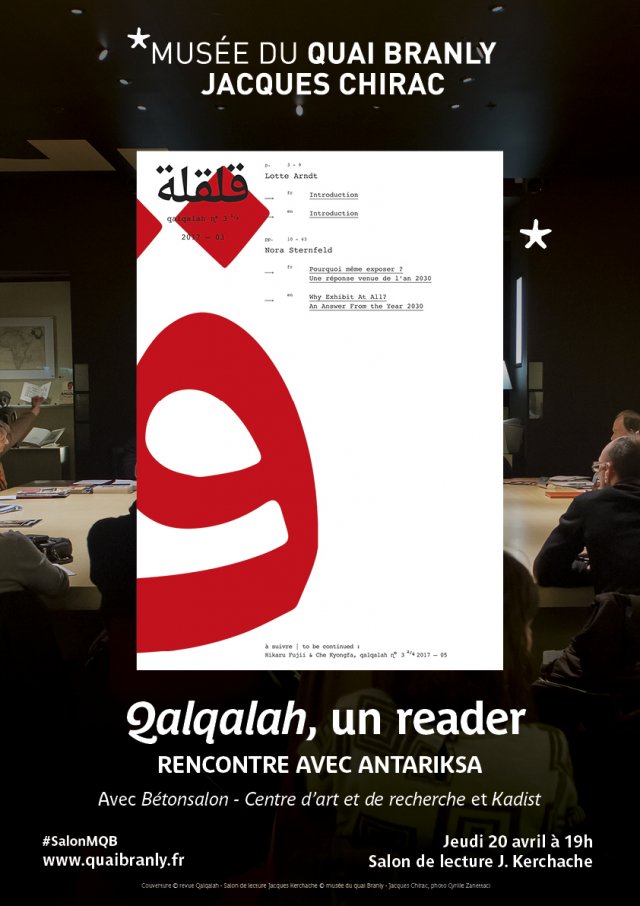Events
PAST EVENTS
Thursday April 20, 2017
At Salon de lecture Jacques Kerchache, Musée du Quai Branly-Jacques Chirac
Navigate through vibration: Qalqalah, A reader
Conversation with Antariksa, held in English

At the initiative of Bétonsalon— art and research center, Villa Vassilieff and KADIST, this evening will look back to the research lines deployed for the last three years in Qalqalah, online and bilingual publication, designed as a shifting place for artists and researchers, but also occidental references.
For this second event taking place at the Salon de lecture Jacques Kerchache, Antariksa, historian and co-fonder of KUNCI - Cultural Studies Centre (Yogyakarta, Indonesia) will present his research, led during his residency at la Maison des Sciences de l’Homme in the framework of the Global South(s) fellowship.
In continuity with his contribution for the second issue of Qalqalah, which focused on commoning (a central notion in learning, doing and living-together processes), Antariksa presents the Paris-based Japanese artists’s experience at the beginning of the 20th century and their interactions with artist collectives in the french capital, from 1914 to 1945. With this subject, Antariksa evokes the transmission’s paths from a parisian "occidental" esthetic to Indonesia through Japan, but also the modalities of this transmission : the way it has been done, and had influenced visually the memory of the two World Wars in Japan and Indonesia.
Antariksa is a historian and co-founding member of KUNCI Cultural Studies
Centre, Yogyakarta, Indonesia—a research collective focusing on critical
knowledge production, research-action, and vernacular education. He is the author
of Tuan Tanah Kawin Muda: Hubungan LEKRA-Seni Rupa 1950-1965 [Tuan
Tanah Kawin Muda: The relation between art and the Institute of People’s Culture
1950-1965] (CAF/IVAA, 2005). His primary research is on art and mobility of
ideas in Japanese-occupied Southeast Asia. He is now working on his new book
日本占領期のインドネシアにおけるアート集団主義 [Art collectivism in
Japanese-occupied Indonesia] (Kyushu University Press, 2017). Antariksa is
currently Associate Fellow of the Institute of Southeast Asian Studies (ISEAS)-
Yusof Ishak Institute, Singapore.
Thursday, October 28, 2016
At Salon de lecture Jacques Kerchache, Musée du Quai Branly-Jacques Chirac
Navigate through vibration: Qalqalah, A reader
Conversation with Lotte Arndt (theoretician, Goethe-Institut Fellow at Villa Vassilieff), Marian Nur Goni (researcher) and the last issues’ editors.
Laying on the work of contemporary artists and projects engaged in assembling of photographic archives related to weakened communities, researcher Marian Nur Goni will offer to reflect on the ways to remedy the memory vacuum by working on image. Her intervention will be preceded by a presentation of Qalqalah’s past and future issues and followed by a discussion between the contributors and the public.
This conversation initiated by Bétonsalon — Centrer for Art and Research and KADIST, will give the opportunity to discuss the research directions determined for Qalqalah these last two years. Qalqalah is a bi-lingual online publication designed as a space of intersection that intends to shift western references.
Qalqalah borrows its title from a text written by the Cairene curator Sarah Rifky. Her eponymous heroin lives in a near future and gradually loses memory in a world where linguistic, artistic and economic notions have quietly collapsed.
Lotte Arndt teaches at the art school l’École supérieure d’art et design de Valence since 2014. In 2013, she finished her PhD dealing with Paris based cultural magazines related to Africa (Paris, Berlin), and worked as researcher in residency at the art school l’École supérieure d’art de Clermont Métropole (2013-2014). She coordinated the artistic research project "Karawane" that accompanied the making of the Belgian pavilion of Vincent Meessen and Katerina Gregos at the Venice Biennale 2015. She is part of the artists and researcher group Ruser l’image; publishes regularly on topics regarding the postcolonial present and artistic strategies in pursuit of subverting Eurocentric institutions and narratives. Recent publications include Crawling Doubles. Colonial Collecting and Affect (with Mathieu K. Abonnenc and Catalina Lozano), Paris, B42, 2016 ; Hunting & Collecting., Sammy Baloji (with Asger Taiaksev), Brussels, Paris, MuZEE and Imane Farès, 2016 and Les revues font la culture ! Négociations postcoloniales dans les périodiques parisiens relatifs à l’Afrique (2047-2012), WVT, 2016.
Marian Nur Goni is an EHESS Phd student. Her researches focus on East African history (with a particular focus on history and anthropology interaction), contemporary art in Africa and its reception in the West, and finally art practices in Africa. She publishes - among others - in Fotota, a research blog co-founded with the historian Érika Nimis. In 2014-2015 she received a grant from Quai Branly museum for collection documentation.
Share